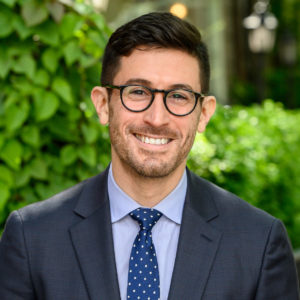 03.03.22 — Professor Ari Ezra Waldman, faculty director of Northeastern Law’s Center for Law, Information and Creativity (CLIC), has been awarded two research grants by the Anti-Monopoly Fund of the Economic Security Project (ESP). Waldman's projects were among only 26 proposals selected to receive investment from the fund, which ESP launched in 2019 in recognition of the critical role of academic scholarship in informing paradigm and policy shifts, specially in the antimonopoly field. He is the only researcher to receive funding for two projects.
03.03.22 — Professor Ari Ezra Waldman, faculty director of Northeastern Law’s Center for Law, Information and Creativity (CLIC), has been awarded two research grants by the Anti-Monopoly Fund of the Economic Security Project (ESP). Waldman's projects were among only 26 proposals selected to receive investment from the fund, which ESP launched in 2019 in recognition of the critical role of academic scholarship in informing paradigm and policy shifts, specially in the antimonopoly field. He is the only researcher to receive funding for two projects.
“To rein in concentrated private power, we need a clear, empirical understanding of the mechanisms that monopolies use to maintain their dominance,” wrote Becky Chao, ESP's director of antimonopoly in a piece for Medium. “There is no better time to invest in antimonopoly scholarship. ”
“I am deeply honored to be the only researcher to receive two grants from the Anti-Monopoly Fund of the Economic Security Project,” said Waldman. “The two projects are both about creating a more democratic, equitable and emancipatory approach to the information economy. In one project, I will work with Georgetown Professor Julie Cohen to create a new paradigm for what privacy law should look like. There is such a need for that because all of our laws and new proposals do nothing to rein in corporate power. With Madiha Choski, an outstanding PhD candidate at Cornell, I will be learning more about the political economy of misinformation, tracking how it infects the law and developing new ways to rejuvenate the rule of law at a time when misinformation threatens shared understandings of reality. It will be hard work, but I can't wait to dig into these projects.”
Project Descriptions
Misinformation, Platform Power and Social Policy
Ari Ezra Waldman, Northeastern University School of Law
Madiha Zahrah Choksi, Cornell Tech
Viral misinformation threatens the civil rights of marginalized populations. Black and Indigenous people are not only targets of misinformation campaigns, but their right to vote is also being curtailed because of the racist “Big Lie” of election fraud. Women are bombarded with lies about the dangers of abortion, all while those same lies form the basis of anti-abortion policy in conservative states. And transgender youth are being barred from living their authentic selves because of persistent lies about adolescent hormone therapy. Little is understood about the mechanics linking (mis)information cascades and social policy. Even less is understood about the ways in which misinformation is changing legal institutions and the ways in which private corporations–particularly, platforms that host misinformation–are leveraging law and technology to concentrate and amplify their power.
We suggest that scholars are insufficiently understanding the extent of the misinformation problem, particularly with respect to its effects on the most vulnerable among us and its contribution to concentrated economic power. This research will fill that gap by exploring the spread of misinformation that is then leveraged by legal institutions to subordinate marginalized populations and the connection between that misinformation and platform power
Regulatory Managerialism and the Rule of Law
Ari Ezra Waldman, Northeastern University School of Law
Julie E. Cohen, Georgetown University
The regulatory state’s increasing entanglement with managerial governance is undertheorized. A quarter century ago, a prominent strand of writing on administrative law and regulatory theory identified a new approach to regulation that it called the “new governance.” But the outputs of managerial frameworks are largely unreviewable by courts, and underresourced regulators have been largely unable (and, often, unmotivated) to peer under the hood of managerial governance models. Proposals for new federal and state privacy legislation in the U.S. would largely codify and cement these developments, undermining prospects for more meaningful public accountability. In other words, we sit at a crucial juncture: Without a new paradigm for public oversight of these processes, we risk entrenching public disempowerment in the face of the managerial turn.
In this project, we will help develop a new paradigm for public oversight of information-intensive economic sectors and activities. Its goals are twofold. First, we seek to develop a vocabulary and a set of concepts for describing regulatory managerialism and its current implementations. Second, we seek to develop the theoretical foundation and a set of more concrete recommendations for assimilating the managerial turn in governance to the rule of law. More specifically, we will ask: (1) What are the elements of regulatory managerialism, including both practices and underlying logics? (2) What are the specific mechanisms by which regulatory managerialism currently resists and coopts preexisting legal-institutional frameworks (3) What are the necessary elements of a new paradigm for publicly accountable and inclusive managerial oversight that can be harnessed to advance democratic values? (4) How might we begin to design and build out these elements?
About Northeastern University School of Law
The nation’s leader in experiential legal education since 1968, Northeastern University School of Law offers the longest-running, most extensive experience-based legal education program in the country. Northeastern guarantees its students unparalleled practical legal work experiences through its signature Cooperative Legal Education Program. More than 1,000 employers worldwide in a wide range of legal, government, nonprofit and business organizations participate in the program. With a focus on social justice and innovation, Northeastern University School of Law blends theory and practice, providing students with a unique set of skills and experiences to successfully practice law.
For more information, contact d.feldman@northeastern.edu.